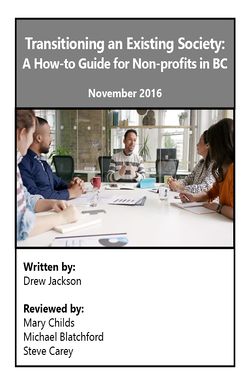Difference between revisions of "Transitioning an Existing Society: A How-to Guide for Non-profits in BC"
Jump to navigation
Jump to search
Drew Jackson (talk | contribs) |
Drew Jackson (talk | contribs) |
||
| Line 12: | Line 12: | ||
**[[What the New Societies Act Means for Existing Societies#You need to "transition", but the new Act applies right away|Requirement to "transition"]]{{·}}[[What the New Societies Act Means for Existing Societies#Your society's constitution may be affected|For your society's constitution]]{{·}}[[What the New Societies Act Means for Existing Societies#Your society's bylaws should be reviewed for compliance with the new Act|For your society's bylaws]]{{·}}[[What the New Societies Act Means for Existing Societies#You need to decide whether to become a member-funded society|Member-funded societies]]{{·}}[[What the New Societies Act Means for Existing Societies#There's a new electronic filing system|New electronic filing system]] | **[[What the New Societies Act Means for Existing Societies#You need to "transition", but the new Act applies right away|Requirement to "transition"]]{{·}}[[What the New Societies Act Means for Existing Societies#Your society's constitution may be affected|For your society's constitution]]{{·}}[[What the New Societies Act Means for Existing Societies#Your society's bylaws should be reviewed for compliance with the new Act|For your society's bylaws]]{{·}}[[What the New Societies Act Means for Existing Societies#You need to decide whether to become a member-funded society|Member-funded societies]]{{·}}[[What the New Societies Act Means for Existing Societies#There's a new electronic filing system|New electronic filing system]] | ||
*[[10 Changes in the New Societies Act You Should Know About|10 | *[[10 Changes in the New Societies Act You Should Know About|10 Changes in the New Act You Should Know About|]] | ||
**[[10 Changes in the New Societies Act You Should Know About#There is greater access to a society's records|Access to society records]]{{·}}[[10 Changes in the New Societies Act You Should Know About#Remuneration paid to directors and certain employees and contractors must be disclosed|Disclosure of remuneration]]{{·}}[[10 Changes in the New Societies Act You Should Know About#There is greater flexibility in conducting members' meetings|Conduct of members' meetings]]{{·}}[[10 Changes in the New Societies Act You Should Know About#The voting threshold for a special resolution has been lowered|Voting threshold for special resolutions]]{{·}}[[10 Changes in the New Societies Act You Should Know About#Members now have the right to bring a "member's proposal"|Member proposals]]{{·}}[[10 Changes in the New Societies Act You Should Know About#Members have more remedies|Member remedies]]{{·}}[[10 Changes in the New Societies Act You Should Know About#There is a new category of "senior managers"|Senior managers]]{{·}}[[10 Changes in the New Societies Act You Should Know About#There are expanded procedures for managing conflicts of interest|Conflicts of interest]]{{·}}[[10 Changes in the New Societies Act You Should Know About#Changes are coming in 2018 relating to who can be a director|Who can be a director]]{{·}}[[10 Changes in the New Societies Act You Should Know About#Changes are coming in 2018 that affect whether directors can be paid|Directors' pay]] | **[[10 Changes in the New Societies Act You Should Know About#There is greater access to a society's records|Access to society records]]{{·}}[[10 Changes in the New Societies Act You Should Know About#Remuneration paid to directors and certain employees and contractors must be disclosed|Disclosure of remuneration]]{{·}}[[10 Changes in the New Societies Act You Should Know About#There is greater flexibility in conducting members' meetings|Conduct of members' meetings]]{{·}}[[10 Changes in the New Societies Act You Should Know About#The voting threshold for a special resolution has been lowered|Voting threshold for special resolutions]]{{·}}[[10 Changes in the New Societies Act You Should Know About#Members now have the right to bring a "member's proposal"|Member proposals]]{{·}}[[10 Changes in the New Societies Act You Should Know About#Members have more remedies|Member remedies]]{{·}}[[10 Changes in the New Societies Act You Should Know About#There is a new category of "senior managers"|Senior managers]]{{·}}[[10 Changes in the New Societies Act You Should Know About#There are expanded procedures for managing conflicts of interest|Conflicts of interest]]{{·}}[[10 Changes in the New Societies Act You Should Know About#Changes are coming in 2018 relating to who can be a director|Who can be a director]]{{·}}[[10 Changes in the New Societies Act You Should Know About#Changes are coming in 2018 that affect whether directors can be paid|Directors' pay]] | ||
Revision as of 21:09, 3 December 2016
|
|
This page is under development. |
|
|
This is a Clicklaw Wikibook, a collaborative, plain language legal publication that is updated as a wiki and can be printed or downloaded. |
|
|
Download the full Wikibook in PDF. |
|
|
Download the full Wikibook in EPUB (learn more). |
|
|
Buy this Wikibook and get it by mail. |
|
|
Customize: take what you need, leave the rest (learn more). |
Aimed at those who work at a non-profit society in British Columbia or sit on a board of directors, Transitioning an Existing Society: A How-to Guide for Non-profits in BC covers the steps in transitioning a society under the new Societies Act.
Contents
Copyright & Disclaimer
![]() Transitioning an Existing Society: A How-to Guide for Non-profits in BC © Drew Jackson is licensed under a Creative Commons Attribution-NonCommercial-ShareAlike 2.5 Canada Licence.
Transitioning an Existing Society: A How-to Guide for Non-profits in BC © Drew Jackson is licensed under a Creative Commons Attribution-NonCommercial-ShareAlike 2.5 Canada Licence.
The information is produced for educational purposes and is not intended as legal advice. If you need advice about a specific legal problem, please contact a legal professional. Some sources of legal help are highlighted in the "Further help" section.
| ||||||||||||||||||||
